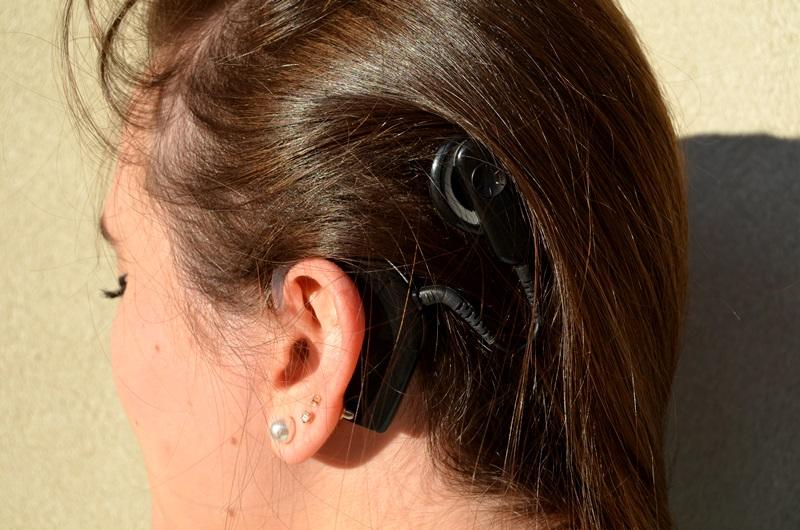Section Branding
Header Content
Emory Students Push For Changes To Sign Language Classes
Primary Content
An online petition wants Emory University to offer American Sign Language classes as a foreign language credit. Currently, the university offers ASL courses for no credit through its independent study program. But students argue this program lacks the proper structure to efficiently learn the language. As our producer Linda Chen reports, the accredited courses could have helped at least one Emory student.
Morgan Leahy was a junior at Emory University when she noticed something was wrong with her hearing. It was gradual at first and then one day...
“I was taking this music class, and I just started to realize I can't hear the music samples. They would say, “Oh can't you hear the trumpet?” and I would say, “Oh there was a trumpet in that piece? I couldn't even hear it,” Leahy said.
Morgan went completely deaf by her senior year. Doctors didn't know what to make of her condition. But after several tests, she was diagnosed with a severe case of vestibular disorder. The vestibular system is a set of sensory organs located within the inner ear. It controls a person's balance and sense of space. So problems with the vestibular can lead to dizziness, blurred vision, and hearing loss.
“It's kind of like if you get off a roller coaster and you know you have trouble seeing. You’re dizzy and in worst cases, you may throw up," Leahy described. "It's similar to that because your vestibular is having trouble calibrating, but mine is just always having trouble calibrating that it's not even there anymore. It’s so nonfunctional."
It became essential for Morgan to learn sign language. But right now, students at Emory have only two options. Either pay for classes off campus or take courses for no credit through the university's independent study program. Morgan chose the latter. Students in her program are expected to learn on their own through instructional videos. Then they meet with a tutor once a week to go over the material. But American Sign Language is complex. Morgan said there's a lot about sign language that's easy to miss.
“A lot of people think American Sign Language is just English with hands where it actually has an incredibly different syntax and grammar structure. So that was frustrating because I'm trying to learn this language through video but like I wasn't learning any grammar or anything."
Others at Emory are on her side. Students with the university's Undergraduate Disability Studies Initiative started an online petition. They want the university to offer American Sign Language classes on campus taught by an accredited instructor.
"It just seems a little shortsighted that Emory doesn't offer this," said Samantha Vanhorn, a doctoral student at Emory University who leads the initiative. She says it's not fair for Emory to ask students to pay extra for classes when they already pay a hefty tuition.
“Emory is very expensive. It's a privilege to be going to Emory in the first place and to ask students to shell out additional money to take classes somewhere else to me seems a bit ridiculous especially since we are such a great school," Vanhorn said.
Fewer than 200 universities and colleges offer American Sign Language as a foreign language credit. ASL is even stigmatized in the deaf community. David Reynolds is a board member of the National Association of the Deaf. He says for a long time, parents discouraged deaf children from sign language and pushed them to learn speak instead. He spoke with me through an interpreter.
"Many in the past thought sign language was not good for the deaf person and was not allowed to use their natural, native language and it's proven quite the opposite. It's quite detrimental to force deaf people to learn orally," said Reynolds.
But the days of hoping for a Helen Keller miracle are changing. Georgia State University was the first public university in the state to offer ASL as a language credit. That was four years ago. Susan Easterbrooks says the addition was long overdue. She is professor emeritus of Deaf Education at Georgia State University. She says offering ASL classes in a university setting is beneficial because it exposes college students to a culture that's misunderstood and silenced.
"The first time a student bumps into a deaf person out in the real world and has a real conversation with them. I think they all find that very exciting and eye-opening that 'Gee I never really thought that people with hearing loss were out there doing things that everybody does.'"
Easterbrooks first approached the Board of Regents back in 2007 so the students at Emory could have a long road ahead of them. More than a thousand people have already signed the petition including the university's president, but the future remains unclear. I reached out to Emory University. The university said in a statement:
“Emory's administration has not yet had the opportunity to see the petition and evaluate the proposal. Currently, Emory accepts American Sign Language (ASL) courses for credit for students transferring to Emory from other universities. Emory also offers a non-credit option for ASL through Emory's SILS program (Structured Independent Language Study)."
Translation: Give us more time.
So it might be too late for Morgan, who graduated last week. But she plans to continue her ASL education after college. And the former music major now has a new career plan.
“I’m actually in many ways grateful that I have become deaf because it has educated me. I would like to work in deaf education and special education if I could but I’m still going through a transition period in my life as I am settling in my new deafness.”



